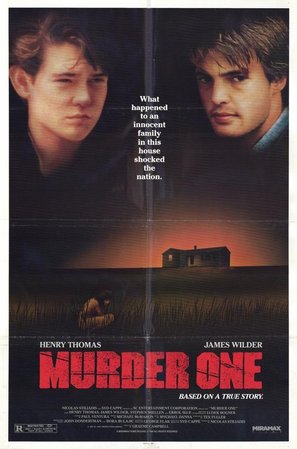 A solid fact-based account of mass murder, thoughtful and naturalistic enough to satisfy true crime buffs while still bloody enough to sate most gore hounds. There’s a reason MURDER ONE isn’t especially well known, but it’s still an above-average example of its type.
A solid fact-based account of mass murder, thoughtful and naturalistic enough to satisfy true crime buffs while still bloody enough to sate most gore hounds. There’s a reason MURDER ONE isn’t especially well known, but it’s still an above-average example of its type.
The subjects of MURDER ONE (1987) were the Isaac Brothers, petty criminals who back in 1973 escaped from a Maryland prison and embarked on a crime spree that culminated in the massacre of a South Georgia family. The film was a low budget affair, though with a “name” actor in the lead: Henry Thomas, at the time struggling to make a name for himself as something other than The Kid from E.T. This film, although it garnered a limited theatrical release and generally positive reviews, did nothing to help his cause.
1973: Billy, a decent but wayward teen, lives in Maryland and works at a gas station. One day his jailbird brothers Carl and Wayne show up at Billy’s house, having escaped from prison together with George, a fellow miscreant. The four embark on a directionless road trip where, driven by equal parts boredom and lassitude, Carl and Wayne commit several petty crimes. But upon attempting to steal a car one morning they’re caught in the act by a too-inquisitive friend of the owner. Wayne ends up shooting the unfortunate man, witnessed by a shocked Billy.
The timid Billy meekly goes along with his brothers and George from there on, even though he realizes they’ve crossed into dangerous territory. The four end up at a secluded Georgia farmhouse that initially provides Carl and Wayne a deserted venue for some horsing around. But then the house’s six owners, five men and one woman, unexpectedly turn up. Carl and Wayne promptly kill all the men and kidnap the woman for use as their sex slave.
By this point a police dragnet has been put into effect, with the four killers’ mugs flashed across TVs around the country. This doesn’t stop Carl and Wayne from attempting a last desperate crime: the robbery of a crowded convenience store. But by this point Billy has had enough, and at last works up the strength to exert himself—but is it too late?
Director Graeme Campbell was clearly aping the style of Terrence Malick’s BADLANDS, certainly one of the foremost true crime sagas. That film, you’ll recall, emphasized the disassociation and boredom of its sociopathic subjects, which is essentially what Campbell does in MURDER ONE. While it will never be mistaken for Malick’s masterpiece, it succeeds in capturing the aimlessness and lassitude of the Isaac Brothers’ killing spree. This puts the film at odds with most modern serial killer flicks, as its subjects aren’t presented as revolutionaries, misunderstood rebels or ravening psychopaths driven by uncontrollable bloodlust. Here we have, quite simply, four maladjusted rednecks with an excess of time on their hands.
There are some problems. Billy’s voice-over narration (another apparent nod to BADLANDS) is plain superfluous, while the film’s overall impact is lessened by bad acting from the supporting players. This is a frequent problem in low budget films: the leads are all carefully and correctly cast while the lesser parts are filled out by whoever’s available.
But the skill and care with which Campbell imbued film are evident throughout, particularly in the protracted violence of the third act. These scenes are graphic and difficult to watch, as they should be, underscoring the senselessness of a tragedy that should have never occurred.
Vital Statistics
MURDER ONE
M-One/SC Entertainment
Director: Graeme Campbell
Producer: Nicolas Stiliadis
Screenplay: Fleming B. “Tex” Fuller
Cinematography: Ludek Bogner
Editing: Michael McMahon
Cast: Henry Thomas, James Wilder, Stephen Shellen, Errol Shue, Susan Bayliss, Warren Van Evera, Roger Barnes, David McKay, John Fox, John Lfebvre, Peter Faussett, Tracy Brett
